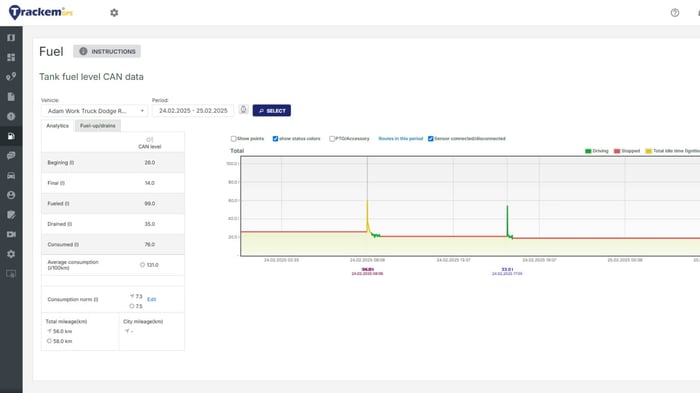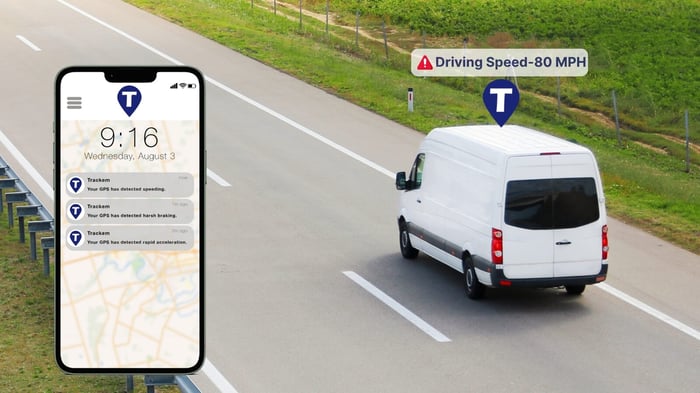Fleet efficiency relies heavily on managing fuel costs, often the largest and most variable expense for fleet managers. Effective fuel management is key to profitability and sustainability. Modern GPS trackers, like those from Trackem, go beyond location monitoring by integrating fuel management features, providing real-time insights into fuel levels, usage, expenses, idling times, and driver behavior.
Today GPS has become an integral part of most fleet operations for a long list of reasons surrounding safety, efficiencies, security, yet perhaps the top priority for most businesses is cost savings. GPS tracking with fuel monitoring capabilities has the potential to decrease total fuel costs anywhere between 10% and 30%. These substaintial fuel cost savings have become a major driver in increasing the demand for GPS tracking and telematics for businesses of all sizes. It's simple, this feature alone can provide the ROI by itself to justify any costs associated with the GPS and telematics system.
Real-Time Fuel Monitoring: Data That Drives Fleet Efficiency Decisions
One of the most valuable functions of vehicle telematics is real-time monitoring of fuel levels, usage, and costs. Here’s how it adds value:
- Fuel Consumption Analytics: GPS systems track usage over time, helping managers identify inefficient vehicles or driving habits. Spikes in consumption can signal mechanical issues, aggressive driving, unauthorized usage or even fuel theft.
- Preventive Maintenance: Monitoring fuel trends helps predict maintenance needs. Higher-than-expected fuel usage may indicate engine inefficiencies.
- Refueling Insights: Tracking when and where refueling happens prevents unauthorized stops and reduces operational downtime.
- Remote Fuel Level Monitoring: Managers can check fuel levels in real time through the Trackem app or web interface, optimizing operations for maximum efficiency.

Reducing Idling Costs: Excessive idling drains fuel and budgets, releasing wasteful emissions into the atmoshphere and impacting overall fleet efficiency. GPS trackers with advanced telematics together with comprehensive GPS software platform offer:
- Alert Systems: Custom alerts notify fleet managers when vehicles idle beyond a set threshold, enabling quick corrective actions.
- Driver Accountability: Tracking idle times reveals patterns, helping managers identify and address habits like leaving engines running during breaks.
- Environmental Benefits: Cutting idling reduces emissions, supporting sustainability goals.
Heavy-duty trucks can waste up to 0.8 gallons of fuel per hour of idling. If a driver unnecessarily idles a fleet vehicle for just one extra hour per day, in one vehicle that will equal over $1000 of wasted fuel per year. Now if your fleet has 100 vehicles all wasting one hour per day of excessive idling, we can quickly see how this extra cost gets high. Many fleets struggle with excessive idling in vehicles that goes far beyond just one hour per day. Reducing idling across a fleet can lead to significant annual savings.
Reducing Your Fleet’s Carbon Footprint
Fuel management systems integrated with the latest GPS trackers from Trackem GPS, support eco-friendly practices by:
- Eco-Driving Metrics: Reports and alerts for hard braking, rapid acceleration, and speeding help managers identify and coach drivers for better and more fuel-efficient driving habits. Over time, this leads to consistent behavior change and measurable reductions in emissions.
- Route Optimization: GPS data is used to plan efficient routes, avoiding traffic and reducing mileage. This helps eliminate unnecessary fuel burn and improves scheduling reliability.
- Fuel Economy Monitoring: Comparing fuel consumption with vehicle benchmarks on individual vehicles and across the fleet identifies improvement areas or the need for vehicle maintenance, replacements, or driver training. Historical trend analysis further aids in refining sustainability strategies.
Lower fuel consumption not only saves money but also has the added benefit of enhancing sustainability goals and initiatives, which is appealing to environmentally conscious organizations and potential clients seeking greener partnerships.

How Fuel Management Saves Money
Effective fuel management involves using GPS and telematics data to optimize operations and cut costs:
- Optimized Routes: Advanced GPS systems suggest shorter or less congested routes, minimizing fuel waste from detours or idling unnecessarily in traffic. This not only saves fuel but also improves delivery times and customer satisfaction.
- Cost Control: Monitoring fuel usage helps fleet managers forecast expenses accurately and avoid unexpected costs. Detailed reports highlight inefficiencies, allowing for proactive budgeting and strategic planning.
- Predictive Maintenance: By linking fuel efficiency to vehicle health, GPS trackers help prevent costly repairs by identifying issues early. This reduces downtime, extends vehicle lifespan, and avoids emergency service expenses.
Ensuring Driver Productivity
Efficient fuel management is not only related to the vehicles but also depends greatly on driver behavior:
- Driver Behavior Tracking: GPS data on speeding, idling, and harsh acceleration helps managers coach drivers for more fuel efficient driving habits. Trackem offers a comprehensive Driver Behaviour module that weights various driving behaviour metrix to match company priorities allowing the system to ouput a driver score. This scoring allows managers to indentify drivers in need of improvement.
- Route Adherence: GPS tracking in combination with the Trackem Driver App, ensures drivers follow planned routes, reducing unauthorized detours or stops and traffic congestion.
- Accountability: Real-time data verifies fuel usage against logged miles, hours worked, or engine hours, preventing or identifying fuel wastage, unauthorized vehicle usage or fuel theft.
Why Telematics for Fuel Management is the Future of Fleet Efficiency
With rising fuel prices, increased environmental regulations/targets and growing fleets, investing in GPS-enabled fuel management is more crucial than ever for true fleet efficiency. Trackem’s system combines location monitoring, real-time notifications, analytics, maintenance modules, driver management, and robust fuel management to provide insights that optimize operations.
By adopting these tools, you can:
- Save significantly on fuel costs.
- Extend vehicle life through preventative and timely maintenance.
- Enhance driver efficiency and accountability.
- Reduce environmental impact and meet sustainability goals.
Modern telematics systems also allow for automated data collection, eliminating manual errors and streamlining reporting processes. They offer visibility into driver behavior—such as idling, harsh braking, and acceleration—that directly affects fuel usage. Real-time alerts help fleets act immediately to reduce waste and inefficiencies. Additionally, integrated reporting dashboards provide actionable insights that inform smarter decision-making. For fleet managers, automated fuel management is no longer just a convenience—it’s essential for long-term success, profitability, and sustainability in an increasingly competitive and regulated landscape that demands real fleet efficiency.
